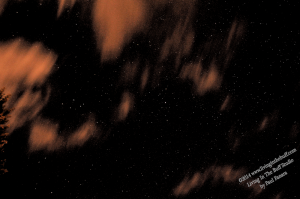“What do you see?” I asked her.
“I see… a light. But there wasn’t a light there before.” She stated with a tone of inquisitiveness
“Stars, and galaxies” I replied to soothe her curiosity. “What your eye cannot see, the camera, given enough time, can.”
“But why? Why can’t I focus on them hard enough to see them myself?” she asked.
“Evolution has provided you with incredible mechanisms for exploring the world around you, but only for what you truly need to survive. Your eyes are remarkable, but limited. Science and technology fill in where our biology doesn’t allow us to go naturally.”
She exhaled a thoughtful, “Hmmm…” as she pondered that. She cocked her head to the right and up once again at the sky, squinting with one eye and twisting her mouth tightly.
“I want to see more,” she demanded, “how can we see more?”
“Well,” I started as I considered my own limitations with the technology accessible to me and what it would cost to get something better, “you can see more with the right equipment, but this is all we have at the moment.”
She cast a disappointing glance at my camera resting steadily on the tripod. She reached to the shutter speed adjustment and opened it up to a 30-second exposure, then to the shutter trigger, pressed it and released it. The camera clacked its shutter open for her, and began capturing all of the light that it could see.
She grew a bit impatient waiting the full 30-seconds for the shutter to finish its cycle, then for the image to appear on the LCD.
She was surprised to see blurs of bright clouds which were barely discernable before, streaking by as if racing across the sky. A bright blue night sky, filled with thousands of tiny points of light and a bright, but shadowy glow from the moon in the southern sky.
“It looks like the stars would look during the day if the sun wasn’t so bright, doesn’t it?” She asked excitedly.
“It certainly does,” I replied with a smile.
She smiled at me, very proud of the results of her experiment.
“Remember,” I explained, “the stars that you see are very, very far away. It has taken thousands, or millions, even billions of years for the light that the camera is seeing to reach it and be captured. The stars that you see may in fact no longer exist, but we are seeing them as they were millions of years ago when the light we’ve just captured began its journey.”
I could see her wrestling with this. She is very bright, but for a child her age, this is a pretty deep concept.
“So, it’s almost like going back in time then?” she questioned as if she were simply sorting out her thoughts out-loud.
“Exactly. You can almost say that you, and I are time travelers, and our camera is our time machine, allowing us to see something possibly as old as the Earth itself.”
She reached out for my hand while gazing back up to the sky, her eyes still full of the wonder of this discovery. Taking it in, sorting the data, and allowing it to fuel the fires of her imagination.
“Time travel…” she whispered, “we can travel through time.”